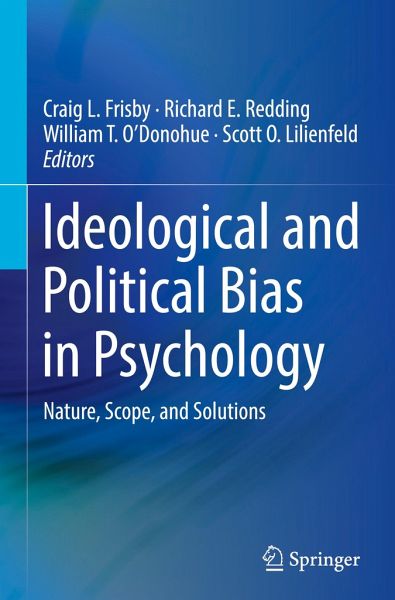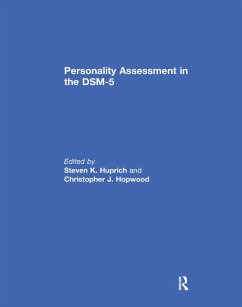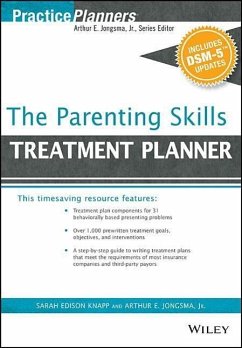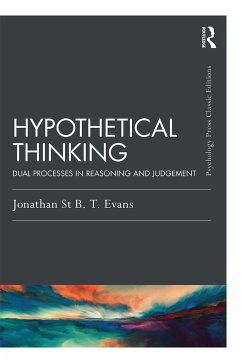
Ideological and Political Bias in Psychology
Nature, Scope, and Solutions
Herausgegeben: Frisby, Craig L.; Redding, Richard E.; O'Donohue, William T.; Lilienfeld, Scott O.

PAYBACK Punkte
57 °P sammeln!
This book examines the traditional assumptions made by academics and professionals alike that have embedded sociopolitical biases that impede practice. and undermine efforts to achieve an objective scientific status. If allowed to go unchallenged, the credibility of psychology as a discipline is compromised. This contributed volume thoroughly and comprehensively examines this concern in a conceptually and empirically rigorous manner and offers constructive solutions for minimizing undue political influences within the field of psychology.Societies in the 21st century desperately need reliable ...
This book examines the traditional assumptions made by academics and professionals alike that have embedded sociopolitical biases that impede practice. and undermine efforts to achieve an objective scientific status. If allowed to go unchallenged, the credibility of psychology as a discipline is compromised. This contributed volume thoroughly and comprehensively examines this concern in a conceptually and empirically rigorous manner and offers constructive solutions for minimizing undue political influences within the field of psychology.
Societies in the 21st century desperately need reliable psychological science, but we don't have it. This important volume explains one of the main reasons why we are making little progress on any issue that gets contaminated by the left-right culture war: because the field of psychology is an enthusiastic member of one of the two teams, so it rejects findings and researchers who question its ideological commitments. The authors ofthis engaging volume also show us the way out. They diagnose the social dynamics of bias and point to reforms that would give us the psychology that we need to address 21st century problems.
Jonathan Haidt, Thomas Cooley Professor of Ethical Leadership, NYU-Stern School of Business and author of The Righteous Mind
The boundaries of free speech, censorship, moral cultures, social justice, and ideological biases are among the many incendiary topics discussed in this book. If you are looking for a deep-dive into real-world contemporary controversies, Ideological and Political Bias in Psychology fits the bill. The chapters are thoughtful and thought-provoking. Most readers will find something to agree with and something to rage at in almost every chapter. It just may change how you think about some of these topics.
Diane F. Halpern, Professor of Psychology Emerita, Claremont McKenna College and Past President, American Psychological Association
Unless the political left is always correct about everything (in which case, we wouldn't need to do research; we could just ask a leftist), the growing political monoculture of social science is a major barrier to our search for the truth. This volume shows how ideological bias should be treated as a source of research error, up there with classic methodological flaws like non-random assignment and non-blind measurement.
Steven Pinker, Johnstone Professor of Psychology, Harvard University, and the author of Rationality
An important read for academics curious about how their politics fashions beliefs that too often are uncritically taken for granted, and for non-academics wondering why we can't shake off the politics that so influences scientific work.
Vernon Smith, Nobel Laureate in Economic Sciences and George L. Argyros Chair in Finance and Economics, Chapman University
Advances and deepens empirically rigorous scholarship into biased political influences affecting academic and professional psychology.
Offers constructive solutions for minimizing undue political influences within psychology and moving the field forward.
Serves as a resource for psychological academicians, researchers, practitioners, and consultants seeking to restore the principles of accurate science and effective practice to their respective areas of research.
Societies in the 21st century desperately need reliable psychological science, but we don't have it. This important volume explains one of the main reasons why we are making little progress on any issue that gets contaminated by the left-right culture war: because the field of psychology is an enthusiastic member of one of the two teams, so it rejects findings and researchers who question its ideological commitments. The authors ofthis engaging volume also show us the way out. They diagnose the social dynamics of bias and point to reforms that would give us the psychology that we need to address 21st century problems.
Jonathan Haidt, Thomas Cooley Professor of Ethical Leadership, NYU-Stern School of Business and author of The Righteous Mind
The boundaries of free speech, censorship, moral cultures, social justice, and ideological biases are among the many incendiary topics discussed in this book. If you are looking for a deep-dive into real-world contemporary controversies, Ideological and Political Bias in Psychology fits the bill. The chapters are thoughtful and thought-provoking. Most readers will find something to agree with and something to rage at in almost every chapter. It just may change how you think about some of these topics.
Diane F. Halpern, Professor of Psychology Emerita, Claremont McKenna College and Past President, American Psychological Association
Unless the political left is always correct about everything (in which case, we wouldn't need to do research; we could just ask a leftist), the growing political monoculture of social science is a major barrier to our search for the truth. This volume shows how ideological bias should be treated as a source of research error, up there with classic methodological flaws like non-random assignment and non-blind measurement.
Steven Pinker, Johnstone Professor of Psychology, Harvard University, and the author of Rationality
An important read for academics curious about how their politics fashions beliefs that too often are uncritically taken for granted, and for non-academics wondering why we can't shake off the politics that so influences scientific work.
Vernon Smith, Nobel Laureate in Economic Sciences and George L. Argyros Chair in Finance and Economics, Chapman University
Advances and deepens empirically rigorous scholarship into biased political influences affecting academic and professional psychology.
Offers constructive solutions for minimizing undue political influences within psychology and moving the field forward.
Serves as a resource for psychological academicians, researchers, practitioners, and consultants seeking to restore the principles of accurate science and effective practice to their respective areas of research.














